
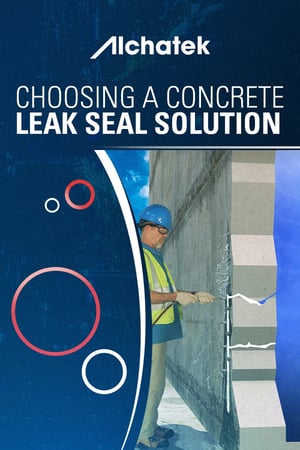 Today, we delve into the technicalities of hydraulic cement and crystalline cement versus polyurethane grout for leak seal injection. This article aims to provide you with detailed, actionable information to guide your decision-making process.
Today, we delve into the technicalities of hydraulic cement and crystalline cement versus polyurethane grout for leak seal injection. This article aims to provide you with detailed, actionable information to guide your decision-making process.
Understanding Your Options
Hydraulic cement, crystalline cement, and polyurethane grout are not competing product categories. Instead, they each offer unique benefits and applications. Hydraulic cement and crystalline cement are cost-effective and easy to apply, making them a go-to solution for many common situations. They share similar properties with basic cement repair, providing a reliable solution for static structures.
However, let’s be clear. If your crack or joint is subject to any significant movement, hydraulic and crystalline cement may fail over time, just like common cement. Yes, crystalline cement does expand over time and fill cracks, but it’s not designed to handle excessive movement. (This fact is actually listed on crystalline cement manufacturer technical data sheets.)
When to Use Polyurethane Grout
Polyurethane grout is the appropriate choice when a structure is subject to movement over time. It’s a more complex and costly solution (in the short term) than simply using hydraulic cement, but worth the investment in the long term.
Consider a three-foot thick potable water tank filled with rebar. You might have a hairline crack - a minor weeper - held together by the rebar. You could easily seal this with hydraulic or crystalline cement, and the leak would stop for the short term. But remember, you still have three feet of water in your concrete, and your rebar is potentially exposed to that.
In such a case, full-depth injection using a polyurethane grout would be highly beneficial. This product has characteristics that hydraulic cement doesn’t have, making it a more reliable solution for dynamic structures.
The Issue of Movement
Movement is the biggest challenge when using hydraulic cement. In manholes, for instance, you’ll often see pipe invert laterals coated with hydraulic cement to stop leaks. But the leaks return year after year, requiring more and more cement.
Why not choose a more lasting solution? Use a urethane once, spend a little more, and have a flexible product in place. You won’t ever have to do it again. It’s simple, and it’s long-lasting.
Final Thoughts
Let’s address a common scenario. Parking garages often operate on tight budgets. When faced with the cost of injecting all the cracks, the owner may not have the entire budget at the moment - but still need to stop the leaks. In such cases, we recommend starting with hydraulic cement or crystalline cement to stop the leak on a short-term basis - but also start saving/budgeting for a permanent polyurethane crack injection solution.
Remember, leaks may return due to structural movement caused by thermal cycles or expansive soil swelling. When they do, you’ll need to address them. By providing a quick solution now and helping plan for the future, we build trust with our clients. Many buildings and parking garages set up remedial grouting programs to address long-term problems periodically.
Contact us for more information on the best grouting solutions for your specific needs. We are committed to providing you with reliable, professional, and detailed information to guide your decisions. Remember, the choice of materials is paramount, and we are here to help you make the best choice.
Want more info on polyurethane leak seal grout and equipment?


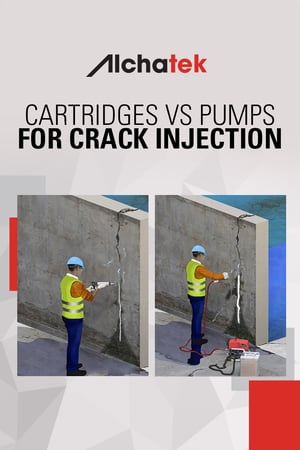 A question that often comes up in our line of work is whether a cartridge can be used to inject cracks, specifically leaking cracks in concrete. The answer is a resounding yes...depending on the situation. In some cases, an electric injection pump is ideal, and in others, a cartridge is the way to go.
A question that often comes up in our line of work is whether a cartridge can be used to inject cracks, specifically leaking cracks in concrete. The answer is a resounding yes...depending on the situation. In some cases, an electric injection pump is ideal, and in others, a cartridge is the way to go.


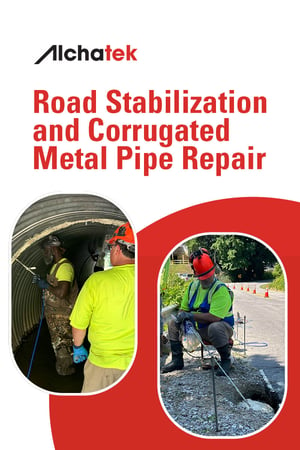 An Oakwood, Georgia corrugated metal pipe rehab job, involving the replacement of the end caps, resulted in soil migration through the new joints. This in turn led to depressions in the asphalt road above. The
An Oakwood, Georgia corrugated metal pipe rehab job, involving the replacement of the end caps, resulted in soil migration through the new joints. This in turn led to depressions in the asphalt road above. The 

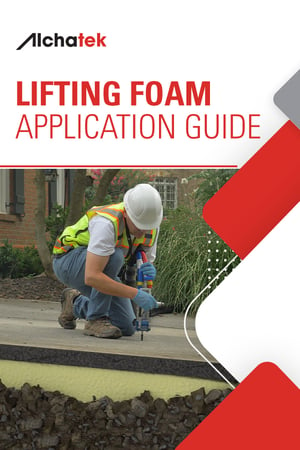 Alchatek's
Alchatek's 
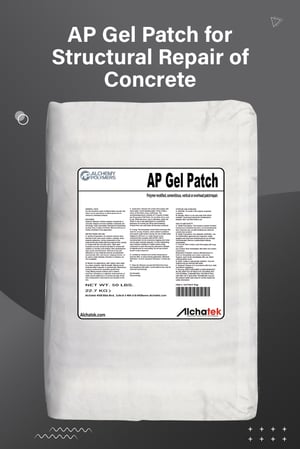 Alchatek's
Alchatek's 
 Today, we delve into the technicalities of hydraulic cement and crystalline cement versus polyurethane grout for leak seal injection. This article aims to provide you with detailed, actionable information to guide your decision-making process.
Today, we delve into the technicalities of hydraulic cement and crystalline cement versus polyurethane grout for leak seal injection. This article aims to provide you with detailed, actionable information to guide your decision-making process.
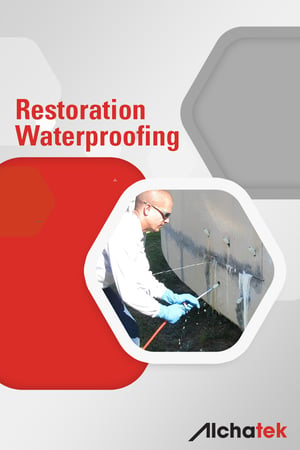 Restoration waterproofing is always a unique undertaking as there are many unknowns. Identifying the source of the infiltration is the obvious first step and it is a challenging one. Properly diagnosing a leak may require numerous steps that include, but are not limited to, inspection, flood testing, dye testing, mock-ups, removal of finishes, and occasionally destructive test methods.
Restoration waterproofing is always a unique undertaking as there are many unknowns. Identifying the source of the infiltration is the obvious first step and it is a challenging one. Properly diagnosing a leak may require numerous steps that include, but are not limited to, inspection, flood testing, dye testing, mock-ups, removal of finishes, and occasionally destructive test methods.
 Are you in search of a reliable material supplier for polyurethane leak seal and geotech applications? Look no further. Alchatek, an industry leader in the manufacture and supply of chemical grouts and construction products, is the partner you need. Alchatek is a name synonymous with trust and reliability.
Are you in search of a reliable material supplier for polyurethane leak seal and geotech applications? Look no further. Alchatek, an industry leader in the manufacture and supply of chemical grouts and construction products, is the partner you need. Alchatek is a name synonymous with trust and reliability.
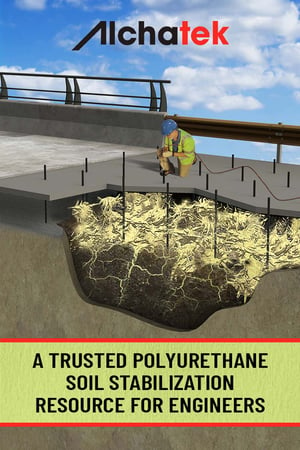 As a geotechnical engineer, you understand the importance of stable supporting soil around structures. When the supporting soil becomes unstable, the stability of the structure is at risk. Common causes of unstable soil include erosion, poor compaction, freeze/thaw cycles, and decomposition of organic materials within the soil. Fortunately,
As a geotechnical engineer, you understand the importance of stable supporting soil around structures. When the supporting soil becomes unstable, the stability of the structure is at risk. Common causes of unstable soil include erosion, poor compaction, freeze/thaw cycles, and decomposition of organic materials within the soil. Fortunately, 

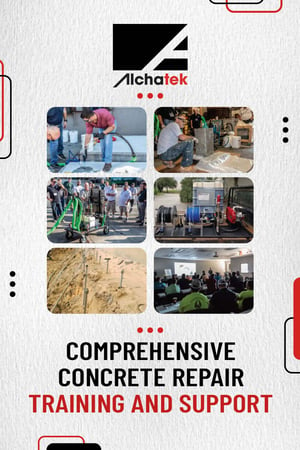 In the world of polyurethane geotech and leak seal repair applications, the quality of the products used is undeniably crucial. However, at Alchatek, we firmly believe that the success of your projects is not solely reliant on the products alone. It is the combination of superior products and comprehensive training and support that truly drives success.
In the world of polyurethane geotech and leak seal repair applications, the quality of the products used is undeniably crucial. However, at Alchatek, we firmly believe that the success of your projects is not solely reliant on the products alone. It is the combination of superior products and comprehensive training and support that truly drives success.
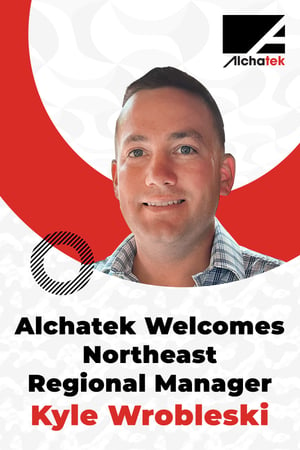 Kyle Wrobleski brings a wealth of industry experience and expertise to benefit Alchatek customers in the Northeastern United States. With a background in business development and sales, combined with hands-on knowledge of concrete and construction, Kyle is uniquely qualified to assist contractors and engineers with a wide variety of projects.
Kyle Wrobleski brings a wealth of industry experience and expertise to benefit Alchatek customers in the Northeastern United States. With a background in business development and sales, combined with hands-on knowledge of concrete and construction, Kyle is uniquely qualified to assist contractors and engineers with a wide variety of projects.